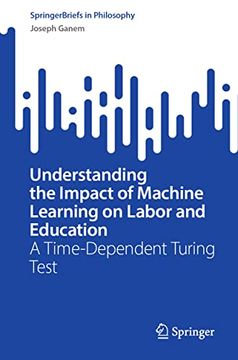Understanding the Impact of Machine Learning on Labor and Education: A Time-Dependent Turing Test
Synopsis "Understanding the Impact of Machine Learning on Labor and Education: A Time-Dependent Turing Test"
This book provides a novel framework for understanding and revising labor markets and education policies in an era of machine learning. It posits that while learning and knowing both require thinking, learning is fundamentally different than knowing because it results in cognitive processes that change over time. Learning, in contrast to knowing, requires time and agency. Therefore, "learning algorithms"-that enable machines to modify their actions based on real-world experiences-are a fundamentally new form of artificial intelligence that have potential to be even more disruptive to labor markets than prior introductions of digital technology. To explore the difference between knowing and learning, Turing's "Imitation Game,"-that he proposed as a test for machine thinking-is expanded to include time dependence. The arguments presented in the book introduce three novel concepts: (1) Comparative learning advantage: This is a concept analogous to comparative labor advantage but arises from the disparate times required to learn new knowledge bases/skillsets. It is argued that in the future, comparative learning advantages between humans and machines will determine their division of labor. (2) Two dimensions of job performance-expertise and interpersonal: Job tasks can be sorted into two broad categories. Tasks that require expertise have stable endpoints, which makes these tasks inherently repetitive and subject to automation. Tasks that are interpersonal are highly context-dependent and lack stable endpoints, which makes these tasks inherently non-routine. Humans compared to machines have a comparative learning advantage along the interpersonal dimension, which is increasing in value economically. (3) The Learning Game is a time-dependent version of Turing's "Imitation Game." It is more than a thought experiment. The "Learning Game" provides a mathematical framework with quantitative criteria for training and assessing comparative learning advantages. The book is highly interdisciplinary-presenting philosophical arguments in economics, artificial intelligence, and education. It also provides data, mathematical analysis, and testable criteria that researchers in these fields will find of practical use. The book calls for a rethinking of how labor markets operate and how the education system should prepare students for future jobs. It concludes with a list of counterintuitive recommendations for future education and labor policies that all stakeholders-employers, employees, educators, students, and political leaders-should heed.

